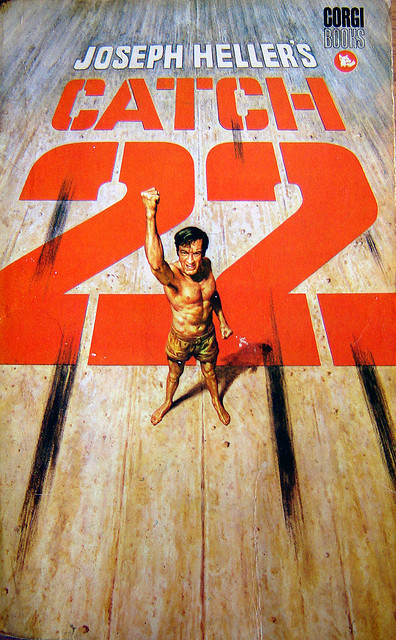“...[A]nything worth dying
for ... is certainly worth living for.”
 Catch-22 by Joseph Heller is set
during WWII on island of Pianosa (though the setting is of little importance). It
follows the story of a common soldier, Yossarian, and his friends. Yossarian
has lost many of his colleagues and friends to the war. His problems are
further perpetuated by Colonel Cathcar, who keeps raising the number of
missions the men had to fly to complete their service. No matter, how much
Yossarian longs to be sent home, he is trapped by a ‘Catch-22’. The term, coined
by Heller, refers to the paradoxical set of circumstances that the characters
are often faced with; especially, the idea that any soldier who is willing to
fly is insane and could be sent home if he asked for it, however, as soon as he
asks to be sent home he shows concern for his safety and is therefore of a
rational mind.
Catch-22 by Joseph Heller is set
during WWII on island of Pianosa (though the setting is of little importance). It
follows the story of a common soldier, Yossarian, and his friends. Yossarian
has lost many of his colleagues and friends to the war. His problems are
further perpetuated by Colonel Cathcar, who keeps raising the number of
missions the men had to fly to complete their service. No matter, how much
Yossarian longs to be sent home, he is trapped by a ‘Catch-22’. The term, coined
by Heller, refers to the paradoxical set of circumstances that the characters
are often faced with; especially, the idea that any soldier who is willing to
fly is insane and could be sent home if he asked for it, however, as soon as he
asks to be sent home he shows concern for his safety and is therefore of a
rational mind.
Heller’s satirical book is,
despite initial controversy, a defining novel of the 20th Century.
Despite it being set during WWII, the book concerns postmodernist ideas. The
book is still taught in schools and contains important critiques that can still
be applied to modern society. Any reader has to be prepared to face the absurdity
of Heller’s work. Personally, I did not enjoy the book. However, this is
because I prefer the structure and predictability of Victorian literature. But
I am glad that I read this book. I thought Heller presented very important
ideas and I agreed with many of his values; some of these ideas will be
explored later in this review.
The novel has become
representative of postmodernist literature by its subversion of form to
represent the zeitgeist of the time. The book uses an ‘anti-novel’ structure
and an ‘anti-hero’. The book rejects many of the traditional novel formats. The
book is not written in chronological order and does not follow the structure of
introduction, climax and conclusion. Instead the reader is introduced to
Yossarian in a hospital talking about events that will only occur at the end of
the book. Yossarian talks about the death of Snowden during a mission that isn’t
described until the second last chapter of the book. The novel also has an
ambiguous ending, living questions unanswered. Yossarian, the protagonist, is
not a ‘hero’. Yossarian has many faults and is quite insane – or at actually he
is quite sane in an insane world. Yossarian does not have the courage and
intengrity that heroes often display. The whole plot follows Yossarian’s plan
to escape, including the lies he creates to stay in a hospital where he can
escape his duties. These are two of the main ways that Heller changes the
format of books in order to represent the new values of the postmodern world.
Themes